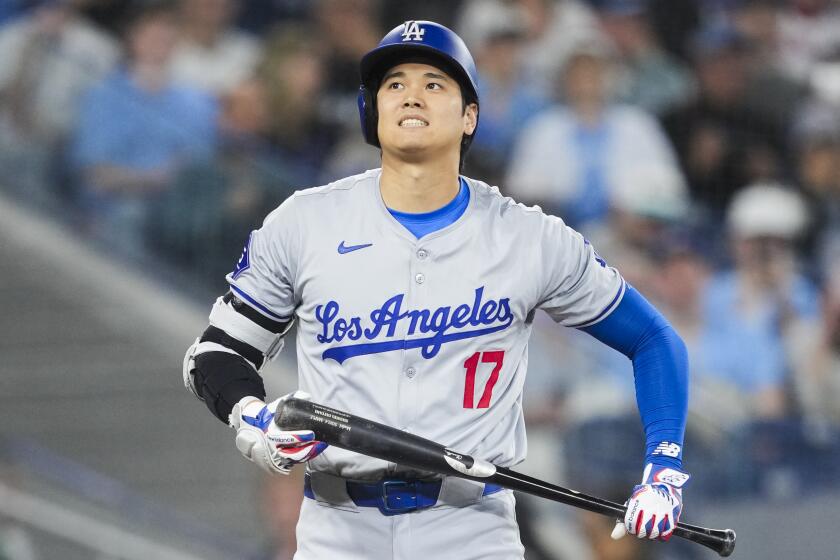Ousted Umpires Have Few Options
Labor law experts say that the recent mass resignation by umpires against major league baseball was, as union legal strategies go, a classic case of a blown call.
The final score: The 22 replaced umpires who are hoping to get their jobs back appear to have scant hope of winning reinstatement through the courts.
“Umpires usually throw other people out of the game. This time they threw themselves out of the game,” said Roger I. Abrams, a labor and sports law expert at Northeastern University in Boston and author of a 1998 book, “Legal Bases: Baseball and the Law.”
“This will go down as one of the great wrongheaded labor strategies of all time.”
According to labor lawyers, there are three big legal problems presented by the resignation of 57 umpires last month.
First, by quitting, the umpires lost the protection of the National Labor Relations Act, which has covered workers’ union activities since the 1930s. The act applies only to employees, and the umpires, once they quit, no longer were employees.
“As nonemployees, they can’t demand that an employer sit down and bargain with them,” Abrams said.
Second, the umpires appear to have violated a no-strike clause in their contract, putting them on shaky legal ground.
The third big problem is that there are only limited grounds under the law by which umpires, or any other employees, can compel employers to reinstate them--even when they quickly try to rescind their resignations, as the umpires did.
“This was not good judgment on Mr. Phillips’ part,” said William B. Gould IV, a Stanford law professor and former chairman of the National Labor Relations Board, referring to Richie Phillips, umpires union counsel.
Phillips failed to return a call seeking comment.
On the other hand, if the union can prove that major league baseball singled out union activists in deciding which ones to replace, it may have a case.
The key question is, “What standard are they using, and are they using one that’s prohibited by law?” said Thomas Geoghegan, a Chicago union lawyer. “If they’re taking out union militants, it seems to me an unfair labor practice.”
The union also could argue in court that the resignations amounted to “constructive discharge,” meaning that the employees were forced out by onerous working conditions. Still, “if there is evidence of this kind, I haven’t seen it,” Gould said.
Ralph E. Nelson, special assistant to baseball Commissioner Bud Selig, said the replaced umpires were ousted, effective Sept. 2, solely on the basis of “merit.”
“There was absolutely no discrimination,” he said. “Baseball had the right to replace anyone who resigned.”
Labor experts said that the umpires’ maneuver was a poor way to gain leverage in labor negotiations, even aside from the legal issues. The main problem, labor experts said, is that the umpires were too easy to replace.
“What a stupid move!” said Robert F. Walker, a management lawyer who has represented the Dodgers in salary arbitration cases. “Why would you ever take this type of action? You’re asking for your resignation to be accepted, and you don’t have a unique skill. It’s one thing to replace someone who hits 50 home runs a year, but I don’t think there’s something unique in replacing an umpire. There are lots of people who are capable of performing this job.”
Kenneth Shropshire, chairman of the American Bar Assn.’s sports-law section and a professor at the University of Pennsylvania’s Wharton School, added, “I think they just miscalculated how valuable they were to the league. You end up with basic contract law. An offer was made. An offer was accepted. The deal’s already done.”
Marvin Miller, the retired chief of the baseball players’ union and often considered the dean of sports labor tactics, said there now is “not a thing” the umpires can do.
“What was appalling about it was that they gave the employer a whole variety of weapons to use against them,” Miller said. The league “will hire back who they want. But they hold all the cards.”
With the umpires breaking into factions, Miller said, the union is sapping itself of perhaps its only remaining strength.
“When you consider that a union’s strength is its unity--look at what they’ve done,” he said. “It’s clear that unity is not one of the things they’ve got left here.”
What’s more, labor experts said, the umpires have had little hope of pressuring management by whipping up public sympathy in their favor. Take, for example, major league baseball’s push to impose a uniform strike zone, an issue resisted by the umpires.
“I don’t think anybody can quarrel with the proposition that this is important to the integrity of the game, and it should not be left to the discretion of the umpires,” Gould said.
*
ANGELS ROUTED: Jim Edmonds was back, but the Angels lost to Kansas City, 12-4. Page 3
VALUABLE VALDES: Dodger General Manager Kevin Malone praises pitcher Ismael Valdes. Page 5
More to Read
Get our high school sports newsletter
Prep Rally is devoted to the SoCal high school sports experience, bringing you scores, stories and a behind-the-scenes look at what makes prep sports so popular.
You may occasionally receive promotional content from the Los Angeles Times.






